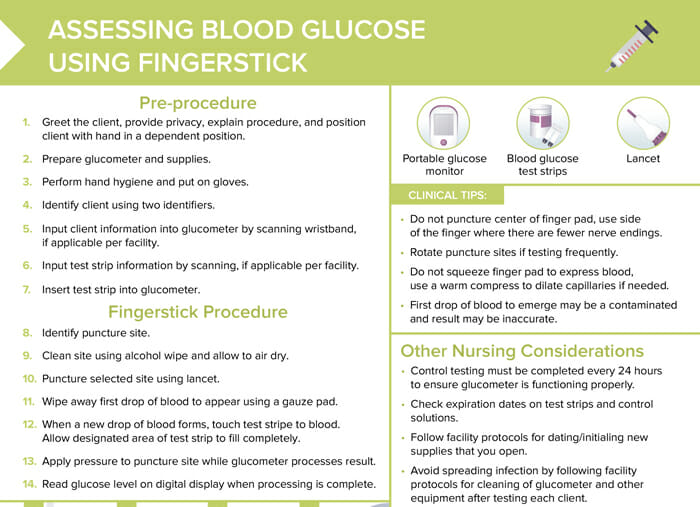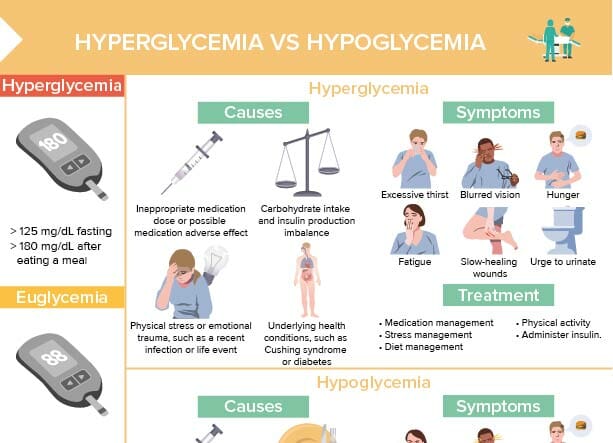What is hypoglycemia?
Hypoglycemia is a condition when blood sugar/glucose levels are too low: blood sugar < 70 mg/dL (3.89 mmol/L).
What is reactive hypoglycemia?
Reactive hypoglycemia, also known as postprandial hypoglycemia, is a condition characterized by low blood sugar levels that occur within a few hours after eating a meal.
What causes hypoglycemia?
Hypoglycemia can be caused by:
- Taking insulin incorrectly (wrong timing, dosage, etc)
- Waiting too long to eat after medication or not eating enough
- Exercise in extreme amounts or at unusual times
- Not monitoring blood glucose levels
- Drinking alcohol
What are symptoms of hypoglycemia?
Hypoglycemia presents with these symptoms:
- Irritability
- Blurred vision
- Hunger
- Headache
- Fatigue
- Irregular heartbeat
How to treat hypoglycemia
Treatment of hypoglycemia includes:
- Medication, stress, and diet management
- Consuming 15–20 g of fast-acting carbohydrates (e.g., glucose tablets, honey, fruit juice, or soda)
- Administering glucagon injection
- Assessing for possible tumor or hormonal imbalances
What is hyperglycemia?
Hyperglycemia is a condition when blood sugar/glucose levels are too high:
- > 125 mg/dL fasting (6.94 mmol/L)
- > 180 mg/dL after eating a meal (9.99 mmol/L)
What causes hyperglycemia?
Hyperglycemia can be caused by:
- Inappropriate medication dose or possible medication adverse effect
- Carbohydrate intake and insulin production imbalance
- Physical stress or emotional trauma, such as a recent infection of life event
- Underlying health conditions, such as Cushing syndrome or diabetes
What are symptoms of hyperglycemia?
Typical symptoms of hyperglycemia are:
- Excessive thirst
- Blurred vision
- Hunger
- Fatigue
- Slow-healing wounds
- Urge to urinate
How to treat hyperglycemia
Measures taken against hyperglycemia include:
- Medication management
- Stress management
- Diet management
- Physical activity
- Administering insulin
What is euglycemia?
Euglycemia is the state where blood sugar levels are in a normal range: fasting 70–100 mg/dL (3.89–5.55 mmol/L)
Hypoglycemia vs hyperglycemia: comparison table
Table: Summary of hyper- vs hypoglycemia
| Hyperglycemia | Hypoglycemia | |
| Causes |
|
|
| Symptoms |
|
|
| Treatment |
|
|
How often should blood sugar/glucose levels be checked?
In a client who is prone to fluctuating blood glucose levels, it is important to monitor the reading. The frequency can vary depending on the client’s specific needs, the type and severity of diabetes, and the current treatment plan. Some clients may need to check their blood glucose levels multiple times a day, including before meals, before bedtime, and possibly before and after exercise.
What are long-term complications associated with chronic hyperglycemia and repeated hypoglycemia episodes?
Chronic hyperglycemia can damage blood vessels and nerves over time, leading to long-term complications such as heart disease, stroke, kidney disease, vision problems, neuropathies, poor wound healing and an increased risk of infections.
Repeated severe hypoglycemia can lead to cognitive impairment and neurologic damage, cardiovascular disease (arrhythmias), and in extreme cases, can be life-threatening.
What should I do when a client shows signs of severe hypoglycemia or hyperglycemia?
Severe hyperglycemia needs urgent medical attention. Insulin or other treatments may be needed, along with close monitoring.
For clients with severe hypoglycemia, give a source of fast-acting sugar. If unconscious or unable to swallow, administer glucagon if available, and seek emergency medical assistance immediately.

